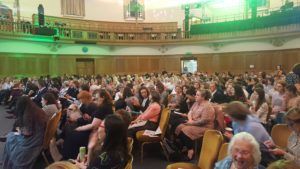Inevitably, a recurrent theme at last night’s Intelligence Squared ‘Women in Power’ event was the importance of avoiding aggression and listening to other points of view.
 And so, there was condemnation of Boris Johnson’s rhetoric. Classicist Mary Beard called the PM “juvenile”. Tory Peer Sandip Verma said that this sort of language can spill “out onto the streets”. Rachel Reeves MP reminded us that her friend, Jo Cox, died believing we have far “more in common than that which divides us”. As the discussion continued, there was support for language policing and all-women shortlists; the overwhelmingly female audience nodded approvingly. I did, too.
And so, there was condemnation of Boris Johnson’s rhetoric. Classicist Mary Beard called the PM “juvenile”. Tory Peer Sandip Verma said that this sort of language can spill “out onto the streets”. Rachel Reeves MP reminded us that her friend, Jo Cox, died believing we have far “more in common than that which divides us”. As the discussion continued, there was support for language policing and all-women shortlists; the overwhelmingly female audience nodded approvingly. I did, too.
But there wasn’t much evidence of those “other points of view”. When the discussion opened up to questions, most audience members were keen to show that they, too, were united in approval of the speakers. There was a cosy sense that we were all part of the same club.
And then a woman stood up and asked: What if men and women are just biologically different? And men are biologically better suited to power?
People actually hissed. The woman who had asked the question tried to keep speaking; everyone on the panel started speaking over her. Cosiness was replaced by overt hostility, even aggression. Because suggesting that men are biologically better at some stuff has become, to modern feminists, the ultimate taboo.
I don’t think men are biologically better suited to power. But a lot of people probably do. It’s not a marginal opinion, it’s a mainstream one. And I have no model to argue against it, because in so many feminist circles it is too horrific to even discuss.
The panel was originally supposed to include Priti Patel, and it suffered from her absence. The evening might have been less cosy, less clubby – it might have shown that just because women need to be protected from violence, it doesn’t mean we need to be protected from disagreement.







Join the discussion
Join like minded readers that support our journalism by becoming a paid subscriber
To join the discussion in the comments, become a paid subscriber.
Join like minded readers that support our journalism, read unlimited articles and enjoy other subscriber-only benefits.
SubscribeThank you for having the perspicacity and honesty to pierce through the numbing tendency of groups today to be intolerant under the guise of tolerance, diversity and inclusiveness. And to have the journalistic courage to report on it.
I have grown up ( I am now 70 ) to witness the unprecedented irony of the splitting up of a society into mutually exclusive identity groups many of which see themselves as the vanguard of objectivity and freedom of thought and speech. Sadly, this has degenerated into highly restrictive environments in which there is no diversity of thought or expression at all. Just echo chambers.